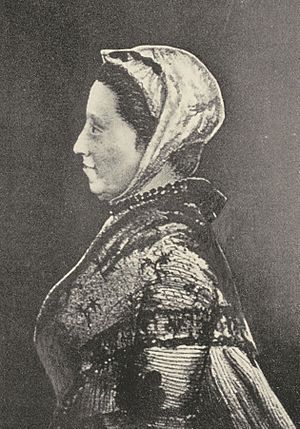Alison Cockburn facts for kids
Quick facts for kids
Alison Cockburn
|
|
|---|---|
 |
|
| Born |
Alison Rutherford
8 October 1712 |
| Died | 22 November 1794 (aged 82) |
| Nationality | Great Britain |
| Known for | poet, wit and socialite |
Alison Cockburn (born Alison Rutherford) was a Scottish poet and a very popular person in Edinburgh during the 1700s. She was known for her cleverness and for bringing together many famous friends. These friends included important thinkers and writers like Walter Scott, Robert Burns, and David Hume. She lived from October 8, 1712, to November 22, 1794.
Contents
Early Life and Marriage
Alison Rutherford was born in 1712 at Fairnilee House in the Scottish Borders. This area is between the towns of Galashiels and Selkirk. Her father was Robert Rutherfurd.
In 1731, Alison married Patrick Cockburn of Ormiston. He was a lawyer, but he didn't have much money. Because of this, they lived for four years with her husband's elderly father. He was a very strict man who didn't approve of things like card games, plays, or dancing.
After her father-in-law passed away, Alison and Patrick moved to Edinburgh. There, Alison started to meet many new people. Even though she wasn't from a very high-ranking family, her lively personality and quick wit made her very popular.
A Close Call During the Jacobite Rising
In 1745, there was a big rebellion in Scotland called the Jacobite rising of 1745. During this time, Alison was a strong supporter of the British government (called a Whig). She even wrote a short, funny poem (called a "squib") making fun of Bonnie Prince Charlie, the leader of the rebellion.
One day, she was riding in a carriage through Edinburgh with this poem in her pocket. She almost got caught by the Highland guards who supported Prince Charlie! Luckily, she managed to avoid them.
Life After Her Husband's Death
Alison's husband died in 1753, leaving her with a small income. Sadly, her only child also passed away when he was very young. Despite these difficulties, Alison continued to be a lively and welcoming person. She lived in Edinburgh, first on Bristo Street and later on Castlehill and Crichton Street.
People said she had "an insatiable love of mischief, mockery and match-making." She was always welcome everywhere, known as a good friend who could even joke about her own problems.
Her Famous Poem
In 1765, Alison Cockburn published her own words for a traditional Scottish song called Flowers of the Forest. The first line of her version is "I've seen the smiling of Fortune beguiling."
Some people believe she wrote this poem before she got married in 1731. They say it was about a time when many wealthy families in Selkirk lost their money. However, other historians think it was written about a man named John Aikman, whom Alison might have liked when she was younger.
It's important not to confuse Alison's version of the song with another popular one. Another Scottish poet, Jean Elliot, also wrote lyrics for "Flowers of the Forest" in 1756.
Friends and Influence
Alison Cockburn was known for her wide circle of famous friends. She was a central figure in the intellectual life of Edinburgh during the 1700s, a period known as the Scottish Enlightenment.
- Young Walter Scott: In 1777, she met a young boy named Walter Scott, who would later become a very famous writer. She described him as "the most extraordinary genius of a boy."
- Robert Burns: She became friends with the famous poet Robert Burns in 1786. She said he had "a most enthusiastic heart of love."
- David Hume: Alison was also a great friend of the important philosopher David Hume.
Alison was a tireless letter-writer. She also enjoyed writing parodies (funny imitations), squibs (short, witty poems), toasts, and "character sketches" (descriptions of people). While she wrote many things, her version of "Flowers of the Forest" is considered her most important literary work. Her letters and writings about her friend and helper, Henrietta Fordyce, also helped make Fordyce well-known.
At her homes in Edinburgh, she welcomed many important people. These included writers like Henry Mackenzie and William Robertson, philosophers like David Hume and Lord Monboddo, and other notable figures like John Home and Lady Anne Barnard. She was also a close friend of Sir Walter Scott's mother, as they were distantly related through her Rutherford family.
Alison Cockburn passed away on November 22, 1794. She is buried in the churchyard of Buccleuch Parish Church in south Edinburgh.
Images for kids
 | Emma Amos |
 | Edward Mitchell Bannister |
 | Larry D. Alexander |
 | Ernie Barnes |


